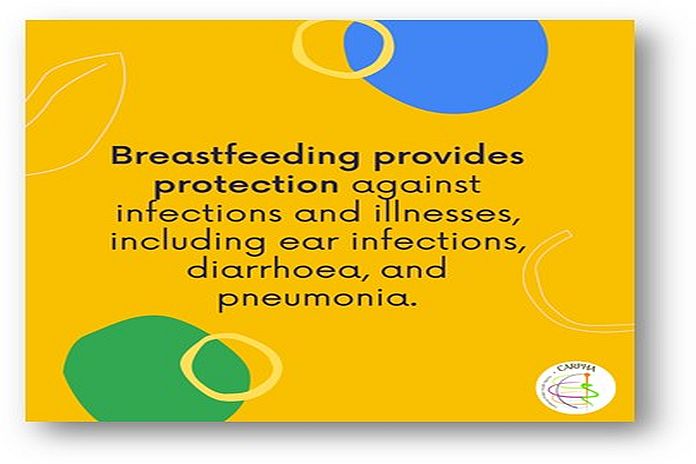PORT OF SPAIN, Trinidad – “Breastfeeding can help to prevent childhood obesity and maternal obesity, which are important risk factors for Type 2 diabetes. If we are to reduce the prevalence of childhood obesity and non-communicable diseases (NCDs) later in life, mothers should try to feed their babies exclusively with breast milk for the first six months of life,” stated Dr Joy St John, on the occasion of World Breastfeeding Week which is observed from 1 to 7 August 2021.
Text description automatically generated with medium confidence in Latin America and the Caribbean only 33 percent of babies younger than six months of age were exclusively breastfed. A survey conducted in collaboration with the University of the West Indies found around 40 percent of mothers in Barbados had to stop exclusive breastfeeding, in order to return to work. During the COVID-19 pandemic, many organisations adjusted to persons productively working from home, a policy which may also benefit breastfeeding mothers in the future.
According to the Lancet Editorial, 2016 the lack of breastfeeding policies is a missed opportunity globally for improved health and economic outcomes. Children who have been breastfed for longer show better performance in intelligence tests, which may result in improved academic performance, long term earnings and productivity.
Economic benefits to governments from improved breastfeeding policies will also include a reduced healthcare burden as seen in the Americas and other regions of the world. In the USA, UK, Brazil and China, breastfeeding translates to reduced healthcare costs of $312 million, $48 million, $6 million, and $30.3 million respectively. Breastfeeding is critical for the health of the mother and baby, as well as the economic health of a country, which highlights the need for breastfeeding to be recognized as a shared responsibility.
The World Health Organization (WHO) recommends initiation of breastfeeding within one hour of birth, exclusive breastfeeding for the first six months of life and continued breastfeeding for up to two years or beyond along with nutritionally adequate and safe complementary foods.
Breast milk, which is specially designed to meet the health needs of a growing baby, provides protection against infections and illnesses, including ear infections, diarrhoea, and pneumonia. Packed with many properties, breast milk is the best source of nutrition and first line of a baby’s defence against infections. Antibodies protect against allergy and infection, and Vitamin A prevents eye disease. Breast milk also helps prevent jaundice and contains fats that are necessary for brain development.
Dr Tamu Davidson, head of the chronic diseases and injury department at CARPHA noted: “Breastfeeding delivers health, nutritional and emotional benefits to both children and mothers. It is a great way for mothers to bond with their babies, and mothers who breastfeed have lower rates of breast cancer, ovarian cancer, Type 2 diabetes, and high blood pressure.”
This year’s theme for World Breastfeeding Week (WBW) “Protect Breastfeeding: A Shared Responsibility” is aligned with thematic area 2 of the WBW-Sustainable Development Goals 2030 campaign which highlights the links between breastfeeding and survival, health and wellbeing of women, children and nations. It will focus on how breastfeeding contributes to the survival, health and wellbeing of all, and the imperative to protect breastfeeding globally.
Protecting breastfeeding is a shared responsibility. It is time for all of us to inform, anchor, engage and galvanise action to protect and support breastfeeding and facilitate the development of regional breastfeeding policies. An important part of protecting and supporting breastfeeding requires a public health approach where governments, civil society, communities and other stakeholders work together to create a breastfeeding-friendly environment.
This is in keeping with the Caribbean Public Health Agency’s life course approach for the prevention of NCDs of which breastfeeding is a key factor. CARPHA supports breastfeeding as a long-term strategy for a more productive and healthier region and encourages mothers to see breastfeeding as the optimal feeding method for infants.
CARPHA has led training in the WHO/UNICEF 40 Hour Breastfeeding Counselling Course; and training of Health Professionals in the 20-Hour Course for Baby-Friendly Hospital Initiative implementation and certification. The Agency has supported Member States with the development of National Infant and Young Child Feeding Policies, and Hospital Breastfeeding Policies. The Agency has also developed guidelines for anyone involved in the care and management of newborns, and pregnant or nursing women suspected of or confirmed to be infected with the COVID-19 virus.
To date, there is no evidence of the COVID-19 virus being present in breast milk or transmitted via breast milk. Because of the benefits of breast milk and breastfeeding, and the negative effects of stopping it, it is recommended that mothers continue to breastfeed. As with all confirmed or suspected COVID-19 cases, symptomatic mothers who are breastfeeding or practicing skin to skin contact should practice respiratory hygiene during feeding (e.g. wearing a mask), perform hand hygiene before and after contact with the child, and routinely clean and disinfect surfaces with which the mother has been in contact.
We call upon all CARPHA member states to take a whole of society approach and implement and reinforce the International Code of Marketing of Breast-milk Substitutes. By protecting breastfeeding, we are also protecting human rights and taking important steps towards achieving the Sustainable Development Goals, leaving no one behind.





